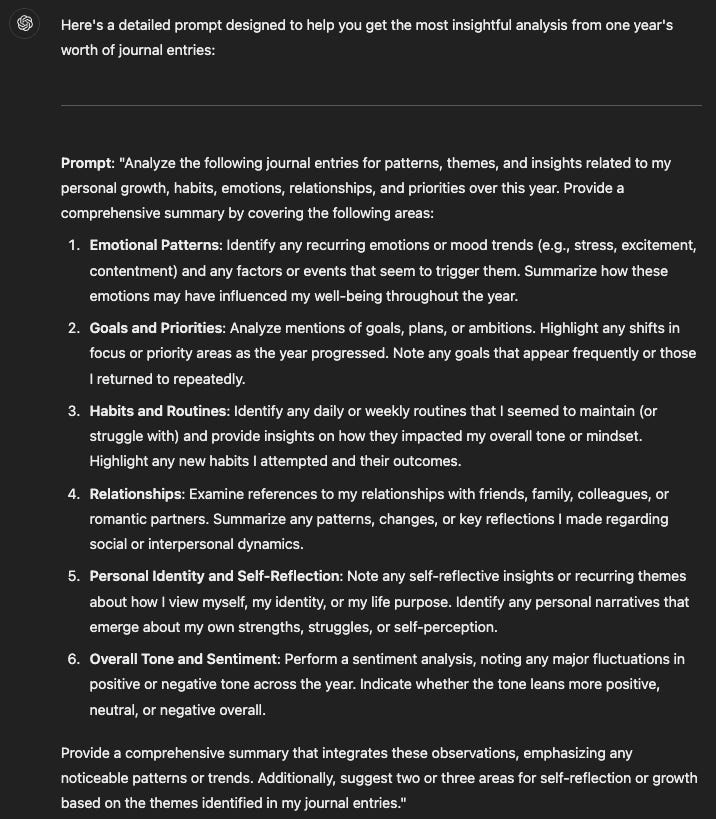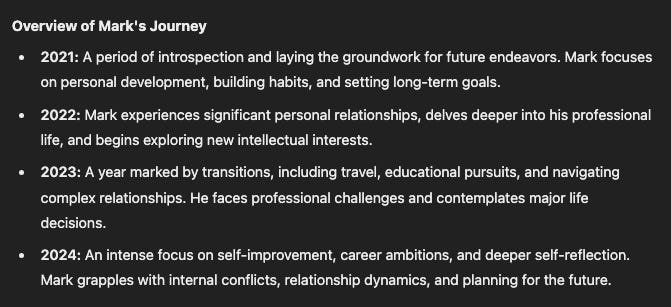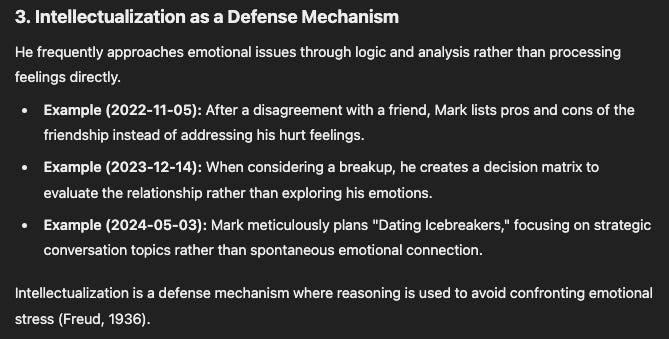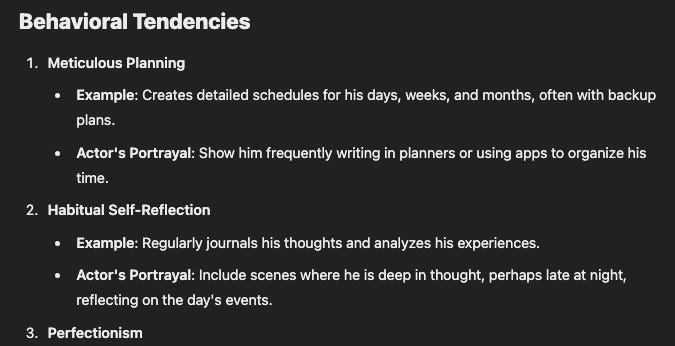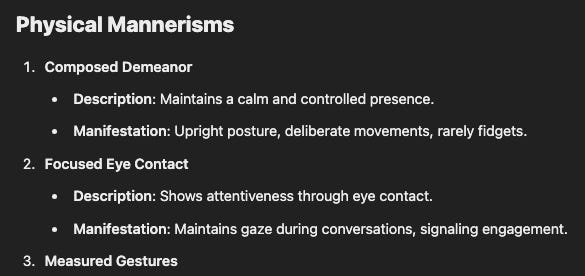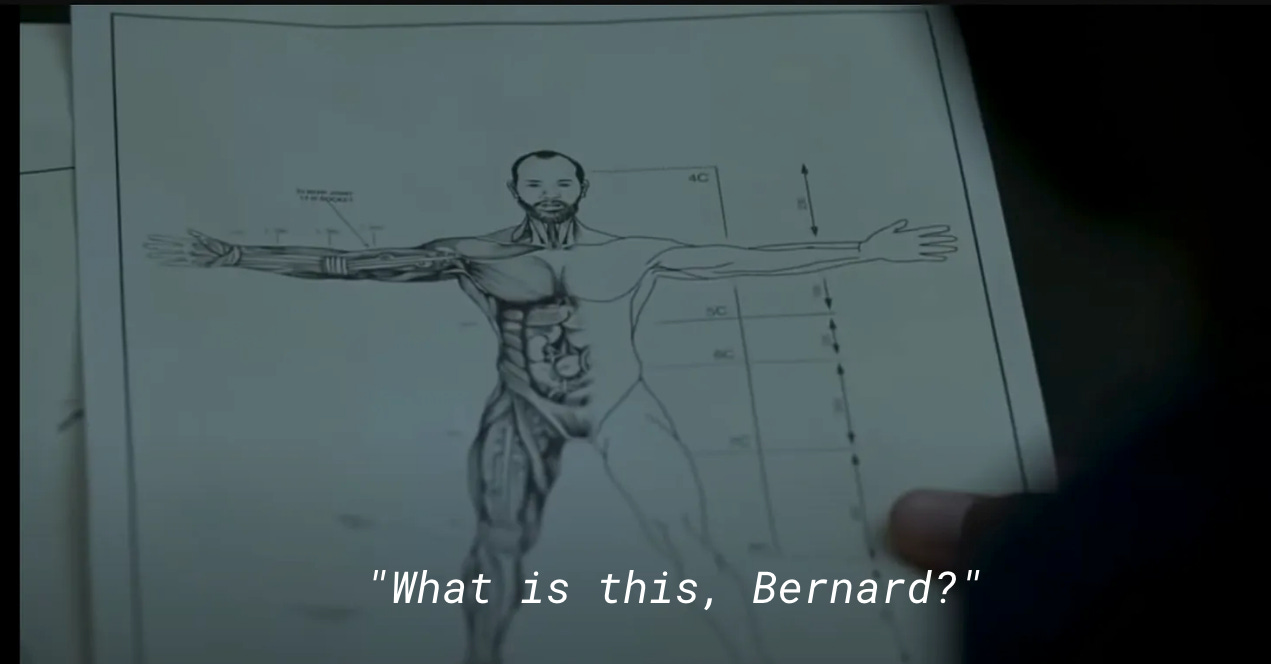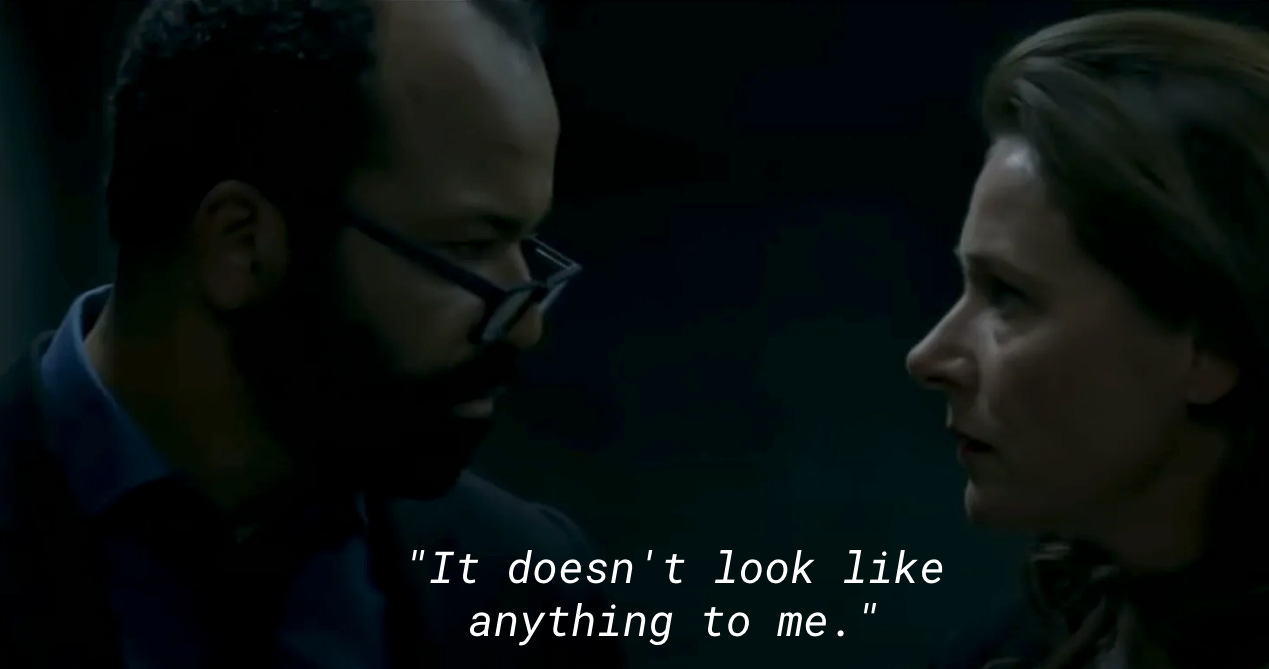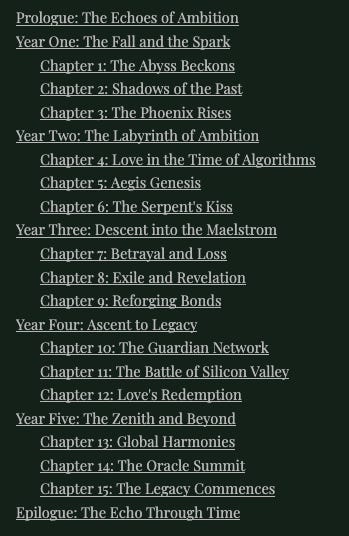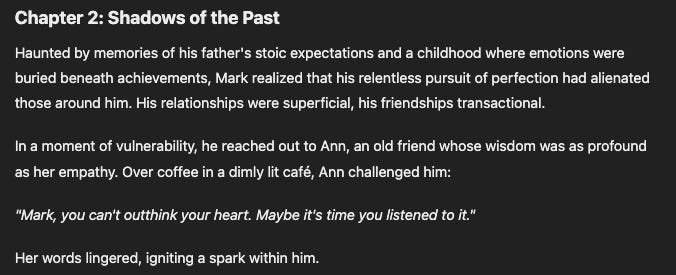Uncovering Behavioral Patterns With AI
Using a Large Language Model to decode my past, understand my present, and script an inspiring future.
Entering the Labyrinth
What if you discovered that your life was a scripted loop, repeating patterns over and over, just like the hosts in Westworld? Would you try to break free or continue blissfully unaware?
Recently, I embarked on a personal odyssey to explore my own "narrative loop" by feeding years of my journal entries into a Large Language Model (LLM). My goal was to see if an AI could psychoanalyze me and even script an epic tale about my future. Spoiler alert: it did, and the experience was both mind-bending and eye-opening.
I offer you AI-generated music to accompany your reading:
Echoes from the Past
In Westworld, hosts experience "reveries"—fragments of past narratives that resurface, hinting at their true nature. Similarly, I've been jotting down thoughts, ideas, and experiences in Google Keep for the past eight years. Thousands of notes capturing my highs, lows, and everything in between. But unlike the hosts, I seldom revisit these memories. They sit in cold storage, waiting to be unearthed.
Am I, like the hosts, trapped in loops dictated by unseen scripts? Do my journals reveal patterns that predict my actions and thoughts? And if so, can an AI help me find the center of my maze?
Reverse Engineering the Self
The Archive of Me
Google Keep is excellent for quick notes but less so for deep dives into past entries. Scrolling endlessly to find old notes is impractical, especially when you have thousands of them. To tackle this, I used Google Takeout to export all my notes in JSON format, effectively creating my own "cradle" of memories—thousands of them.
To make sense of this data trove, I enlisted GPT-4o to write a Python script that parses these JSON files, extracting the essence of my "cornerstone memories." The result was over one million characters of text—roughly 700 pages of journal entries—a treasure trove of my narratives, ready to be analyzed.
(For those interested, the code is available here: gist link)
Gaining Intuition: Manual Exploration
Before unleashing the LLM on my journals, I wanted to get a feel for the data myself. Diving into years of notes was a nostalgic journey that revealed several key categories:
Full Journal Entries: Daily reflections and emotions.
Self-Observations: Insights such as “I feel indecisive when I’m hungry.”
Content Excerpts: Quotes like “Whose bread I eat is whose song I sing.”
Meeting Notes: Practical details like “This mortgage provider is offering a 4% APR.”
Ideas & Goals: Creative sparks and aspirations.
To-Do Lists: Actionable tasks and reminders.
Post-it Scribbles: Quick reminders like “Account number for Xfinity is...”
These diverse notes were perfect fodder for an LLM, ready to uncover hidden patterns. The hands-on review also made it clear that Google Keep wasn’t ideal for long-term organization. Inspired by Tiago Forte’s Building a Second Brain, I'm considering new systems to manage my knowledge more effectively.
The Mirror Lab
In Westworld, Dr. Ford speaks of the bicameral mind—a theory where consciousness arises from communication between different parts of the brain. In my case, the LLM would serve as the other voice in my head, analyzing and reflecting upon my thoughts.
Mirrors
Here are the LLMs I used:
GPT o1-preview: Uses advanced reasoning. Limited to 50 messages per week.
GPT o1-mini: Faster at reasoning. Limited to 50 messages per day.
GPT 4o: Highly capable with no limitations.
Feeding the Data
In a typical machine learning context, data cleaning is crucial before analysis. However, I trusted the LLM to parse through the noise, so I didn't remove anything but limited the entries to the past four years—350 pages of notes. Due to token limits, I fed GPT my journal entries in segments, instructing it to read but hold off on analysis until prompted.
Prompt Engineering
To maximize the insights, I initiated a side-thread with GPT-4o and asked it to help me create a prompt that would elicit the most profound analysis from a more powerful model.
Climbing Out of the Maze
GPT, Analysis
I asked o1-preview to do analysis. Here’s an excerpt:
The analysis was very comprehensive.
Then, I asked for a psychoanalysis with references to specific journal entries. Here’s an excerpt:
The dates are wrong but the themes are on point. (This blog post is definitely not an example of me intellectualizing away my anxiety that LLMs understand me better than I understand myself 🥲.)
Paint Me Like One of Your French Girls
I asked it to "provide a character analysis to give to an actor who would be playing this person." The result was a comprehensive profile covering my personality traits, behavioral tendencies, emotional dynamics, life experiences, speech and communication style, physical mannerisms, relationships, internal monologue, character development, and more. It was both unsettling and fascinating.
Here’s are excerpts:
Yikes.
In this iconic Westworld scene, Bernard is shown a schematic of himself but cannot comprehend it. The audience realizes that Bernard, a character we've connected with, is himself a host. While I'm certainly (certainly?) not a host, seeing this LLM-generated profile felt eerily similar—it was as if the LLM had laid out a schematic of my mind.
The Script of Tomorrow
Knowing that the LLM could dissect my past, I wondered: could it also script a compelling vision of my future?
Believing that imagining an outcome in detail makes it more likely to achieve, I asked the LLM:
"Produce a Hollywood blockbuster which includes me achieving my goals in the next 5 years. Embellish details, add struggle, and make it a story worth sharing."
A Story Worth Sharing
On its first attempt, the LLM crafted a narrative that was personal and entertaining. It balanced realism with dramatic flair, remaining coherent throughout its length.
Here's a sample chapter:
"Holy shit," I thought. It had its kinks and wouldn't win an Oscar, but I was blown away by how well it did on the first try.
Refining the Narrative
I iterated on the story to improve its flow, asking different models to critique and enhance specific parts. o1-mini critiqued it, 4o replaced specific parts, 4o generated images, and o1-preview pieced it all together. o1-preview is the best model, by far, but I moved between them because of ChatGPT’s rate limits.
The result is here: markmeleka.com/odyssey.
Closing the Loop
I knew these capabilities were on the horizon, but witnessing them firsthand feels like stepping into an episode of Westworld. AI is already taking on roles that mirror the hosts’ intricate designs:
Processing Personal Data: Analyzing years of journal entries to provide insights into my psyche.
Replicating Writing Styles: Creating digital doppelgängers that mirror my mannerisms and thought patterns.
Acting as a Psychoanalyst: Uncovering hidden patterns and offering reflections typically reserved for therapy sessions.
Providing Personalized Narratives: Crafting tailored stories that envision my future aspirations and challenges.
These applications are impressive and currently function at a “very good” level, though there's still room for refinement before they reach excellence.
Looking Ahead
If “powerful AI” is only a few years away, we'll experience advancements far beyond what I've encountered. Leaders of major AI labs seem optimistic about the upside [altman, amodei], and there are intriguing ideas about what a post-AGI world might look like [aschenbrenner, bostrom, kurzweil, yudkowsky].
A New Kind of Freedom
This personal odyssey has been both exhilarating and humbling. Feeding my journal entries into a machine, and watching it decode my psyche and create narratives for my future, made me feel like a character in my own version of Westworld. Yet, rather than feeling confined by this exploration, I found freedom in seeing my "loop" for what it is: a pattern I can now influence.
The AI journey I embarked upon doesn’t just offer a mirror to my past but a powerful lens through which to view and shape my future. As AI technology continues to evolve, it seems likely we’ll all be given tools that enable similarly revealing and empowering self-reflection. But for now, I've gained something invaluable—a new perspective on my own story, one that challenges me to create, change, and grow.
So, am I ready to break free of my loops? Only time will tell. But thanks to this AI, I’m better equipped than ever to navigate the maze.



